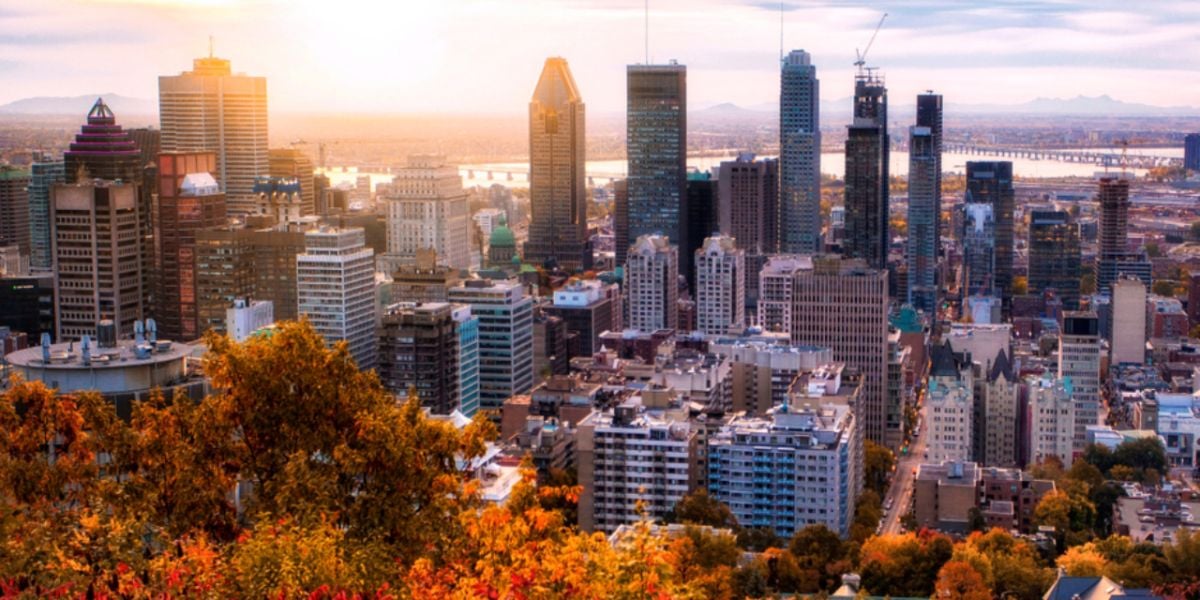
Choosing to study in Montreal is a very good decision. According to the QS Best Student Cities 2023 ranking, this Quebec metropolis has been recognized as the 14th best student city worldwide. This article provides an overview of the universities in Montreal.
Opting for higher education in Montreal comes with several advantages: lower tuition fees compared to other North American universities, a vibrant student life, and the flexibility to study in either French or English. According to the QS Top Universities website, Montreal stands out as a recognized and influential university hub thanks to its diverse education system, rich culture, and affordable cost of living. With 15 universities, Greater Montreal offers a wide range of disciplines to choose from.
Boasting the largest pool of university researchers, Montreal's research cluster is one of the most generously funded in the country. By 2023, three Montreal institutions of higher learning – McGill University, University of Montreal, and Concordia University – are anticipated to be among the top 500 worldwide.
McGill University
If you're looking for a French-language education, McGill University might not be your go-to choice. Established in 1821, McGill, despite its long history, maintains a vibrant atmosphere, partly due to its prime location right in the middle of the business district. The campus is conveniently reachable by both metro and bus, with the McGill metro station situated on the Green Line.
Securing the 30th spot in the QS Top Universities 2024 ranking, this university has the highest percentage of doctoral students among all Canadian universities. Its development model centers around research, evident in the substantial funding of C$687.413 billion allocated to research programs in 2020 and 2021. Offering over 400 study programs, the university is renowned for its exceptional medical program and holds a strong reputation with employers.
In the fall of 2022, McGill University is set to welcome nearly 40,000 students, with 30% of them being international. If you aspire to enroll in a McGill program, you'll be required to submit the results of an English proficiency test, such as IELTS. The university boasts an impressive list of alumni, including Nobel Prize winners, Rhodes Scholars, astronauts, three Canadian prime ministers, 13 justices of the Supreme Court of Canada, foreign leaders, 28 foreign ambassadors, nine Academy Award winners, eleven Grammy Award winners, three Pulitzer Prize winners, and 28 Olympic medalists.
McGill holds a distinguished position as one of the two Canadian universities, along with the University of British Columbia, that is a member of Universitas 21, a network of research-intensive universities. For engineering graduates, McGill is recognized in France under the name UMG Quebec by IESF (Ingénieurs et Scientifiques de France) as part of the ARM France-Quebec for engineers. To learn more about this university, check out its website.
University of Montreal (UoM)
Founded in 1878 as a branch of Laval University, the University of Montreal (UoM) holds the 141st position in the QS Top University Ranking 2024 and stands as the leading center for French-language higher education in North America. Did you know that UdeM is affiliated with École Polytechnique Montréal and HEC Montréal? According to its website, the university hosts 66,972 students, including over 10,000 international students. Renowned for its medical studies and offering more than 600 training programs, UdeM is also a significant player in research investment.
Situated Northwest of Mount Royal Park, the main campus might be slightly off-center, but it's well-connected by Montreal's public transportation network – there's even a metro stop named after the university. If you aspire to follow in the footsteps of notable figures like Hubert Reeves or Denys Arcand, explore the diverse programs available at the University of Montreal.
Concordia University
Situated in a modern building in the vibrant Concordia district of downtown Montreal, Concordia University plays host to nearly 50,000 students, including a diverse community of over 11,000 international students. With a range of over 500 programs, the university prides itself on being flexible, urban, and adaptive to new generations, embodying a spirit of activism. It is also the proud home of the D3 Center for Innovation and Entrepreneurship.
Heading West to the Loyola campus, Concordia houses the Centre for Applied Synthetic Biology, a unique facility in Canada dedicated to advancing fundamental technologies in synthetic biology. Known for its exceptional programs in finance, engineering, and science, Concordia University conducts all its courses in English.
University of Quebec in Montreal (UQAM)
Nestled in the heart of the Latin Quarter, right across from Place des Arts, the University of Quebec in Montreal (UQAM) annually opens its doors to over 4,800 international students. With a rich offering of more than 335 programs in French, UQAM is a significant player in Montreal's academic landscape. The Berri-UQAM metro station, one of the city's key transportation hubs, conveniently serves the university. While UQAM may not boast the same international ranking as UoM, it holds a commendable reputation among Canadian employers.
École de Technologie Supérieure (ETS)
In Quebec, one out of every four engineers is trained at the École de technologie supérieure (ETS). Given its focus on applied engineering and technology, it's no surprise that this institution is highly esteemed in La Belle Province. Moreover, ETS holds the second position in Canada for the number of engineering degrees granted annually at the undergraduate level. Its main competitor, École Polytechnique, secured the sixth spot in Canada and ranked among the top 300 engineering and technology schools globally in 2021, earning the distinction of being the best French-speaking engineering school in Canada.
However, as highlighted on their website, ETS takes a more practical approach to courses, emphasizing extensive laboratory experimentation and project implementation. Additionally, ETS offers a work-study program to assist students facing financial difficulties.
HEC Montreal
HEC Montreal has firmly established itself as a well-known institution. Established in 1907, it holds the distinction of being Canada's oldest business school. Consistently ranking among the top business schools in Canada and globally, the school's MBA program secured the second position in Canada according to the Bloomberg Businessweek 2022 rankings. This reputation attracts a significant number of international students, with 3,676 out of a total of 13,420 students coming from abroad. Graduating from HEC Montreal ensures you'll have a diverse network of contacts all over the world. The campus is situated in the Côte-des-Neiges/Notre-Dame-de-Grâce borough.
HEC Montreal provides a diverse array of academic options, with over a hundred undergraduate, graduate, and postgraduate programs available. Students have the opportunity to specialize in various fields, such as public administration, marketing and sales, cybersecurity, sustainable development, or taxation, to name a few.
École Polytechnique
Polytechnique Montréal consistently secures a position among the top engineering schools in Canada and globally each year. Founded in 1873, it stands as one of the trailblazing institutions in engineering education. Moreover, it is recognized as an influential and highly-regarded research center.
Over 2,000 students at the school come from countries outside of France. Polytechnique Montréal, in its strategic plan covering the years 2018 to 2023, expresses its ambition to gain international recognition for its leadership, boldness, and entrepreneurial spirit. The institution emphasizes the importance of tackling real-world issues for the future.
Polytechnique Montréal offers 12 distinct Bachelor of Engineering programs, and over 110 graduate programs, including doctorates. Accelerated pathways allow faster access from one level to the next.
NAD-UQAC School
Established in 1992, the École des arts numériques, de l'animation et du design de l'Université du Québec à Chicoutimi (NAD-UQAC) is a French-language institution specializing in training and research and development in 3D animation, visual effects, design, and digital arts. Many successful 3D animators in film, television, and video games have undergone training at this institution. Notable programs include the Certificate in 3D Animation and Digital Design, the Bachelor's Degree in 3D Animation and Digital Design, Video Game and Visual Effects for Film and Video, and the Diploma of Specialized Studies in Narrative Video Game Design. The school also provides various exchange programs with European institutions. For more information about the school, you can visit its website.
National School of Public Administration (ENAP)
Being the sole French-speaking university dedicated to public administration in North America, this institution holds extensive expertise in government departments, agencies, municipalities, the health and social services network, the education sector, and foreign public administrations. It is a constituent part of the University of Quebec network, having campuses in Montreal, Gatineau, Saguenay, and Trois-Rivières. ENAP exclusively provides graduate programs in public administration, covering diverse fields such as international administration and management, human resources and organizational development, health and social services management, and program evaluation. For further information about the school, you can visit its website.
Institut de Tourisme et d'Hôtellerie du Québec (ITHQ)
The ITHQ stands out with its 4-star hotel school, two hands-on training restaurants, a bar, two research units, an expertise center, and a robust network of student connections. Nestled in the heart of Montreal, it holds the top spot for educating skilled professionals in the hotel, tourism, and food service sectors. With a faculty of over 120 professors, the majority hailing from the industry, the ITHQ ensures a wealth of expertise. To learn more about this school, you can explore its website.
Other universities in Montreal
UQAT in Montreal is the only university in North America that provides training in art therapy, creation, and new media in French. The Baccalauréat en création de jeux vidéo and the Baccalauréat en création 3D are notably in high demand.
TÉLUQ University, founded in 1972, holds the unique distinction of being the only French-language university in North America that delivers all its programs through distance learning. Annually, almost 20,000 individuals opt for its flexible approach, enrolling in online programs spanning from the first to the third cycle.
The University of Sherbrooke has a campus located in Longueuil, on Montreal's South Shore. The campus provides a diverse range of options, including over 120 undergraduate and graduate programs, along with part-time, evening, weekend, and intensive courses, as well as customized training. Additionally, the campus features amenities such as a library, sports center, food court, and psychology and counseling services.
The Institut national de la recherche scientifique (INRS) stands as the sole institution in the Belle Province exclusively devoted to graduate research and training. Created in 1969 by the Quebec government, INRS encompasses four research centers situated in Montreal, Quebec City, Laval, and Varennes. With 150 professors and an assembly of nearly 1,500 students, postdoctoral fellows, and staff distributed across its various facilities, INRS is a significant hub for advanced research and education.
Important:
To study in Montreal as an international student, you must meet four conditions:
- You must be admitted to a designated educational institution in Montreal;
- You must demonstrate your financial ability to assume the costs of studying and living in Quebec;
- You must pay the fees for the examination of your application;
- You must agree to respect all the conditions of your Certificat d'acceptation du Québec (CAQ).
For everything you need to know about the steps to follow and the study permit, see our article Study permits in Canada.
Useful links:
We do our best to provide accurate and up to date information. However, if you have noticed any inaccuracies in this article, please let us know in the comments section below.








